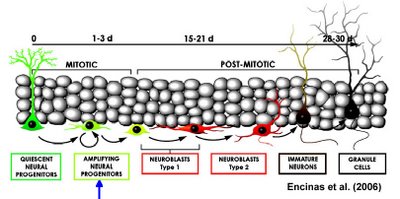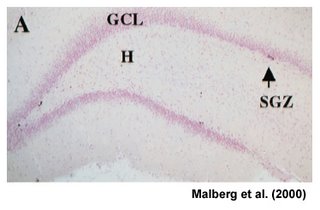Neuroscience
OR, Is Hippocampal Neurogenesis Really Responsible for Antidepressant Treatment Response? [Maybe it's just a convenient marker of neural plasticity...]
The Neurocritic has wondered why hippocampal neurogenesis has been touted as THE therapeutic sequela of antidepressant treatment ever since it was discovered as an interesting "side effect" of SSRI administration in rats. The hippocampus hasn't exactly been associated with mood regulation (the orbitofrontal cortex, sad cingulate, and amygdala, much more likely). Yes, it's thought that depressed people are more stressed, and stress is bad blah blah glucocorticoids blah blah hippocampus... other than that, is there any evidence that damaged hippocampi cause mood disorders? in focally-lesioned rodents? in amnesic humans? Could it be that hippocampal circuitry is more sensitive to a variety of insults (e.g., anoxic-ischemic events, excessive glucocorticoid levels, etc) and therefore, its integrity is a sensitive marker for some of the pathological cellular effects of stress-induced depression? Thus, fixing the ailing hippocampus itself may not be what causes remission of major depressive episodes.
 And about that bureau genesis... what is that? A really brief bible placed by the Gideons in motel drawers? Oh, what? it's neurogenesis? . . . Never mind!
And about that bureau genesis... what is that? A really brief bible placed by the Gideons in motel drawers? Oh, what? it's neurogenesis? . . . Never mind!
And about that neurogenesis. . . What do these new neurons do in adult humans? Are they fully functional?
Anyway, a new study touts neural progenitor cells as the key step for Prozac efficacy, as explained by this New Scientist article:

To be continued...
- Hippocampocingulotastic Mashup
Hippocampal Neurogenesis v Area 25 OR, Is Hippocampal Neurogenesis Really Responsible for Antidepressant Treatment Response? [Maybe it's just a convenient marker of neural plasticity...] How do we resolve the differences between rodent studies that...
- Neuropsychology Abstract Of The Day: "chemo-brain"
Impaired Cognitive Function and Hippocampal Neurogenesis Following Cancer Chemotherapy Clin Cancer Res. 2012 Feb 14; Christie LA, Acharya MM, Parihar VK, Nguyen A, Martirosian V, Limoli CL Abstract PURPOSE: A substantial proportion of breast cancer survivors...
- Abstract Of The Day: Alzheimer Disease Drug Treatments
Brinton RD & Wang JM (2006). Therapeutic potential of neurogenesis for prevention and recovery from Alzheimer's disease: allopregnanolone as a proof of concept neurogenic agent. Curr Alzheimer Res., 3(3), 185-190. Department of Molecular Pharmacology...
- Parkinson Disease
From an NIH press release on 04 July 2006: Dopamine Drug Leads to New Neurons and Recovery of Function in Rat Model of Parkinson's Disease In preliminary results, researchers have shown that a drug which mimics the effects of...
- Growing Neurons From Stem Cells In The Lab
A Reuters report, published in a number of different sources, including Wired News:Stem Cells Get Brainy By Reuters 04:04 PM Jun. 13, 2005 PT WASHINGTON -- Scientists working in mice said they had found a way to identify master cells in the brain...
Neuroscience
Prozac and Progenitor Cells
OR, Is Hippocampal Neurogenesis Really Responsible for Antidepressant Treatment Response? [Maybe it's just a convenient marker of neural plasticity...]

The Neurocritic has wondered why hippocampal neurogenesis has been touted as THE therapeutic sequela of antidepressant treatment ever since it was discovered as an interesting "side effect" of SSRI administration in rats. The hippocampus hasn't exactly been associated with mood regulation (the orbitofrontal cortex, sad cingulate, and amygdala, much more likely). Yes, it's thought that depressed people are more stressed, and stress is bad blah blah glucocorticoids blah blah hippocampus... other than that, is there any evidence that damaged hippocampi cause mood disorders? in focally-lesioned rodents? in amnesic humans? Could it be that hippocampal circuitry is more sensitive to a variety of insults (e.g., anoxic-ischemic events, excessive glucocorticoid levels, etc) and therefore, its integrity is a sensitive marker for some of the pathological cellular effects of stress-induced depression? Thus, fixing the ailing hippocampus itself may not be what causes remission of major depressive episodes.
 And about that bureau genesis... what is that? A really brief bible placed by the Gideons in motel drawers? Oh, what? it's neurogenesis? . . . Never mind!
And about that bureau genesis... what is that? A really brief bible placed by the Gideons in motel drawers? Oh, what? it's neurogenesis? . . . Never mind!And about that neurogenesis. . . What do these new neurons do in adult humans? Are they fully functional?
Anyway, a new study touts neural progenitor cells as the key step for Prozac efficacy, as explained by this New Scientist article:
Pinning down where Prozac worksIn the figure below, the blue arrow shows the step at which fluoxetine has its effect (Encinas et al., 2006).
Prozac, one of the most common drug treatments for depression, acts by stimulating the growth of new neurons in the hippocampus. Grigori Enikolopov and his team from Cold Spring Harbor Laboratory in New York wanted to narrow down which steps in neurogenesis the drug was influencing. So they created mice with nuclei in their nerve cells that glow green during neurogenesis, making it easy to count and compare the number of developing neurons.
By tracking other factors associated with different stages of neurogenesis, Enikolopov's team found that only one step was actually influenced by Prozac: amplifying the neural progenitor cell, just downstream of the stem cell (see article in PNAS).

Juan M. Encinas, Anne Vaahtokari, and Grigori Enikolopov
Fluoxetine targets early progenitor cells in the adult brain
PNAS 103: 8233-8238. May 23, 2006
...We have generated a reporter mouse line, which allows identification and classification of early neuronal progenitors. It also allows accurate quantitation of changes induced by neurogenic agents in these distinct subclasses of neuronal precursors. We use this line to demonstrate that the selective serotonin reuptake inhibitor antidepressant fluoxetine does not affect division of stem-like cells in the dentate gyrus but increases symmetric divisions of an early progenitor cell class. We further demonstrate that these cells are the sole class of neuronal progenitors targeted by fluoxetine in the adult brain and suggest that the fluoxetine-induced increase in new neurons arises as a result of the expansion of this cell class. This finding defines a cellular target for antidepressant drug therapies.
To be continued...
- Hippocampocingulotastic Mashup
Hippocampal Neurogenesis v Area 25 OR, Is Hippocampal Neurogenesis Really Responsible for Antidepressant Treatment Response? [Maybe it's just a convenient marker of neural plasticity...] How do we resolve the differences between rodent studies that...
- Neuropsychology Abstract Of The Day: "chemo-brain"
Impaired Cognitive Function and Hippocampal Neurogenesis Following Cancer Chemotherapy Clin Cancer Res. 2012 Feb 14; Christie LA, Acharya MM, Parihar VK, Nguyen A, Martirosian V, Limoli CL Abstract PURPOSE: A substantial proportion of breast cancer survivors...
- Abstract Of The Day: Alzheimer Disease Drug Treatments
Brinton RD & Wang JM (2006). Therapeutic potential of neurogenesis for prevention and recovery from Alzheimer's disease: allopregnanolone as a proof of concept neurogenic agent. Curr Alzheimer Res., 3(3), 185-190. Department of Molecular Pharmacology...
- Parkinson Disease
From an NIH press release on 04 July 2006: Dopamine Drug Leads to New Neurons and Recovery of Function in Rat Model of Parkinson's Disease In preliminary results, researchers have shown that a drug which mimics the effects of...
- Growing Neurons From Stem Cells In The Lab
A Reuters report, published in a number of different sources, including Wired News:Stem Cells Get Brainy By Reuters 04:04 PM Jun. 13, 2005 PT WASHINGTON -- Scientists working in mice said they had found a way to identify master cells in the brain...
